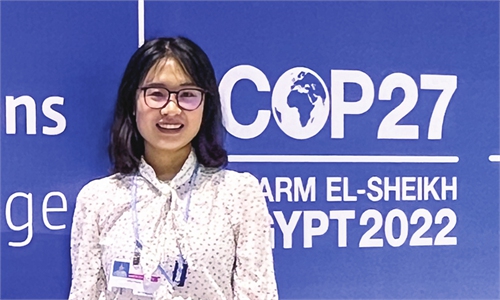IN-DEPTH / DIPLOMATIC CHANNEL
China presents a remarkable model in achieving sustainable development: Egyptian ambassador
Connected, renewable paths
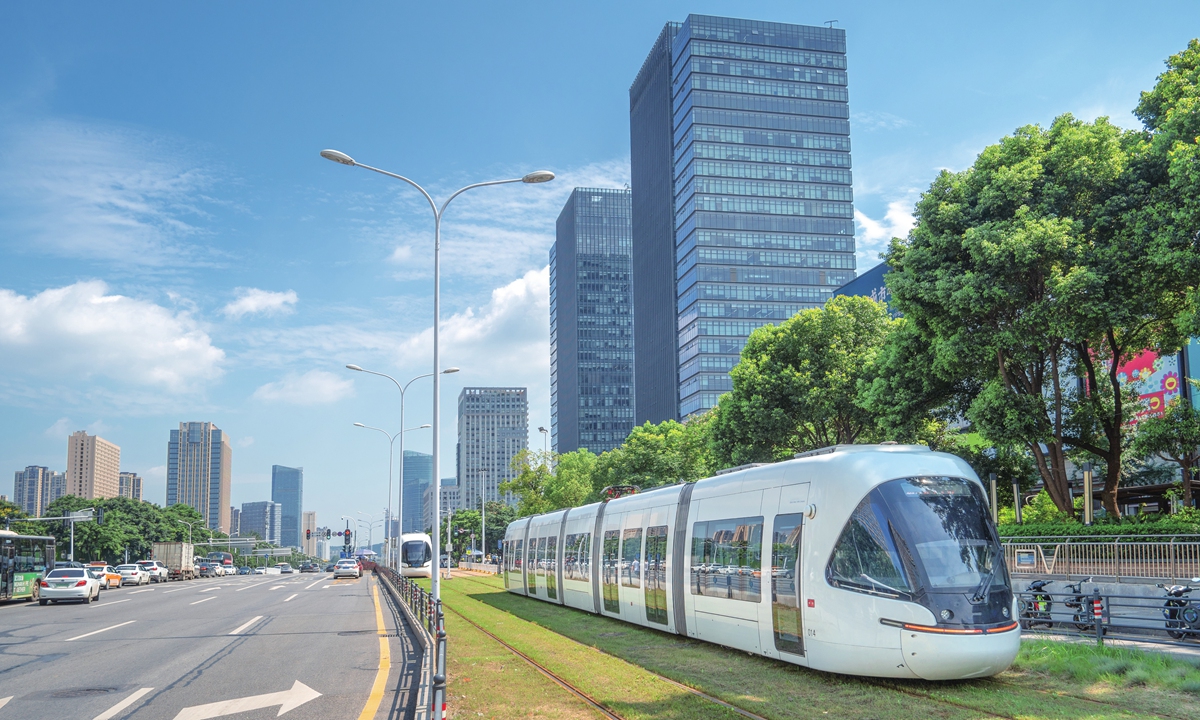
An "Optics Valley Quantum" electric tramcar in Central China's Wuhan adopts various ecological and energy-saving technologies. Photo: VCG
Editor's Note:
The 27th Conference of the Parties to the United Nations Framework Convention on Climate Change (COP27) concluded in Sharm el Sheikh, Egypt on Sunday. The conference reached a relatively balanced package of outcomes and sent a positive signal of upholding multilateralism and a jointly enhanced response to the global climate crisis. China attached great importance to this meeting, and fully supported Egypt in making it a success. In addition to the COP27, China and Egypt have also initiated wide-ranging cooperation under the framework of the Belt and Road Initiative (BRI). The Global Times reporter Xie Wenting (GT) interviewed the newly appointed Egyptian Ambassador to China Assem Hanafi (Hanafi) to elicit his thoughts on the COP27, cooperation under the BRI, as well as the future of China-Egypt bilateral ties.
GT: The COP27 just concluded. What were some of the highlights from the conference that you would like to share?
Hanafi: Egypt believes that the climate crisis will aggravate social, economic, and environmental threats. Hence, urgent and serious actions are needed to address the climate crisis and to strengthen the implementation of a response with an aim to create a resilient planet. Egypt's priority in COP27 was to move from talks, negotiations, and planning to actual implementation. It is the time for action on the ground and we need to move quickly toward full, timely, inclusive, and at-scale action on the ground. In addition to that, there is a necessity to harmonize global efforts, and turn our pledges and commitments to action; this is our highest priority. We can all agree that in order to help developing countries address climate change, it is essential that we make significant progress on the crucial issue of climate finance while moving forward on all finance-related items on the agenda.
The importance of adequacy and predictability of climate finance is key to achieving the goals of the Paris Agreement. To this end there is a need for enhanced transparency on finance flows and facilitated access to meet the needs of developing countries especially African countries or LDCs (least developed countries). Developed nations need to take urgent measures to help climate-vulnerable developing countries to better cope with the impacts of climate change. Such measures include financing targeted infrastructure projects and mechanisms to share risk through financial markets. The economies of developing countries face accelerating climate threats such as hurricanes in the Caribbean and Latin America and floods in Asia and Africa.
GT: How do you assess China's commitment to dealing with climate change at the COP27?
Hanafi: China plays a pivotal role in combating climate change, and has supported various projects in line with the agenda. There is a mutual vision between our two countries when it comes to the necessity of continuing the global effort to mitigate climate change impacts, and compensate the least developed countries for losses and damages suffered, while commending the level of cooperation on these issues at the bilateral and multilateral levels.
China and the group of the 77 play a vital role in putting forward the interests of developing countries regarding climate change negotiations. The high level of cooperation between China and the Egyptian presidency of COP27 continues to become stronger, with far reaching results that will have lasting positive impacts for both peoples and the rest of the developing countries.
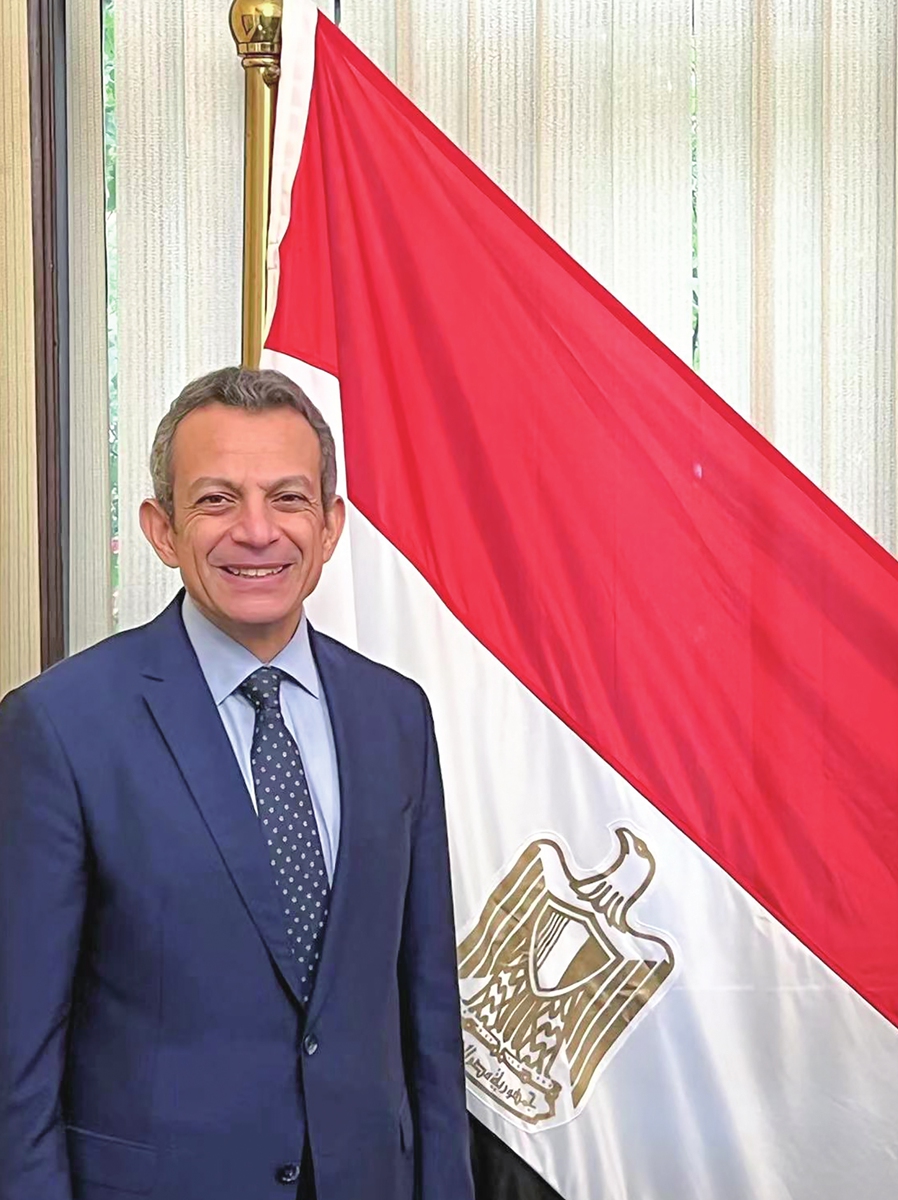
Egyptian ambassador to China Assem Hanafi Photo: Courtesy of Egyptian embassy to China
GT: How do you evaluate the implications of the COP27 on the world as it faces increasing climate change pressures?
Hanafi: Extreme weather events from heatwaves, floods, and forest fires have become an everyday reality in our lives. The Global Goal on Adaptation was one of the significant outcomes of the COP26. The COP27 should push forward an enhanced global agenda for action on adaptation, confirming what we agreed on in Paris and further elaborated on in the Glasgow pact with regard to placing adaptation at the forefront of global action. It is essential that we make significant progress on the crucial issue of climate finance while moving forward on all finance-related items on the agenda.
GT: How do you evaluate China's development over the last decade? What parts of China's development have impressed you the most? From your point of view, what are the development experiences that both countries can share with each other?
Hanafi: I am a newcomer to China, as I just arrived in October 2022, and I have only visited Shanghai to participate in a forum on financing development at the New Development Bank (NDB). The Modern Chinese urban scene is impressive; a true cosmopolitanism with a vibrant lifestyle, fusing modern and ancient cultures, and I am looking forward to visiting many Chinese provinces in the coming period in order to strengthen cooperation between our two countries in various fields.
China presented a remarkable model in achieving sustainable development, notably in eradicating extreme poverty, as it succeeded in elevating more than 800 million from extreme poverty by 2021 and 10 years ahead of the timeframe previously set by the sustainable development goals (SDGs) by 2030, which is considered an economic miracle by all means, and a case study that should be adopted by many developing countries, especially amid the major challenges that we are facing during the current period.
Egypt and China are two ancient civilizations with a lot in common, and there is a huge opportunity for cooperation between the two friendly countries through cultural activities and people-to-people exchanges, that will be beneficial for both sides.
Pursuant to the above, Egypt is also consolidating its efforts to combat poverty and elevate the living standards of its people, as H.E. Mr. Abdel Fattah Al-Sisi, President of the Arab Republic of Egypt, launched several national initiatives in this regard to achieve comprehensive and sustainable development goals, such as the Decent Life Initiative or Haya Karima, which aims to provide a decent life for the most vulnerable groups nationwide and contributes to enhancing the quality of daily public services provided to citizens, especially aimed at inhabitants of rural areas.

The 2nd edition of the summit of the Green Middle East Initiative, held on the sidelines of the COP27 climate conference in Egypt on November 7, 2022 Photo: VCG
GT: How do you assess the cooperation between Egypt and China under the BRI?Hanafi: Egypt is part and parcel of the BRI, due to its unique geographical location among three continents, as it represents a gateway for the Chinese products to many foreign markets. Egypt succeeded in attracting Chinese investments under the BRI framework, and one of the flagship projects is the China-Egypt TEDA Suez Economic and Trade Cooperation Zone, as it has gradually become one of the important platforms for China-Egypt economic and trade cooperation and cultural exchange, attracting around 96 enterprises, 40 of which are manufacturing enterprises.
The cooperation between the two countries under the BRI is robust, and is consistently expanding. We are looking forward to attracting more investments in TEDA over the coming period, as the project is expanding into additional phases, and the two sides succeeded in reaching an agreement on the China-aided vocational and technical training center project.
GT: How do you evaluate the importance of economic cooperation between China and Egypt when the world is experiencing economic downturn pressures?
Hanafi: Egypt and China are blessed with two ancient civilizations and long histories with enduring legacies to humanity, and their positive contributions have been manifested in various domains. Currently we are facing an unprecedented challenge that has not been witnessed for a century which had a severe impact on the economic development especially on developing countries and emerging markets, and now it's imperative to consolidate our efforts so that we can reach a solution as soon as possible.
The cooperation between Egypt and China represents a remarkable model for South-South cooperation, China-Arab cooperation, and China-Africa cooperation, under the guidance and wisdom of presidents of the two countries, as the two countries succeeded in increasing the trade balance on an annual basis despite repercussions suffered from the COVID-19 pandemic on the global economy, in addition to the keenness of the two sides to expand cooperation in new fields, which was manifested in the joint COVID-19 vaccine production cooperation, as both countries signed an agreement in 2021 for the first joint Sinovac vaccine production in Africa, in addition to a cooperation agreement in January 2022 to establish a cold storage facility for vaccine storage and preservation, which can accommodate up to 150 million doses of coronavirus disease vaccines annually. It was successfully inaugurated in September 2021 and will enhance vaccine storage capacity in Egypt and make it a regional hub for vaccines in the African continent.
In light of the above, the two countries can synergize their efforts through promoting trilateral cooperation in Africa in different fields especially the ones related to the basic needs and the elevation of the living standards of our African friends, which will have a win-win outcome for all parties and accelerate the frequency of sustainable development in the African continent.
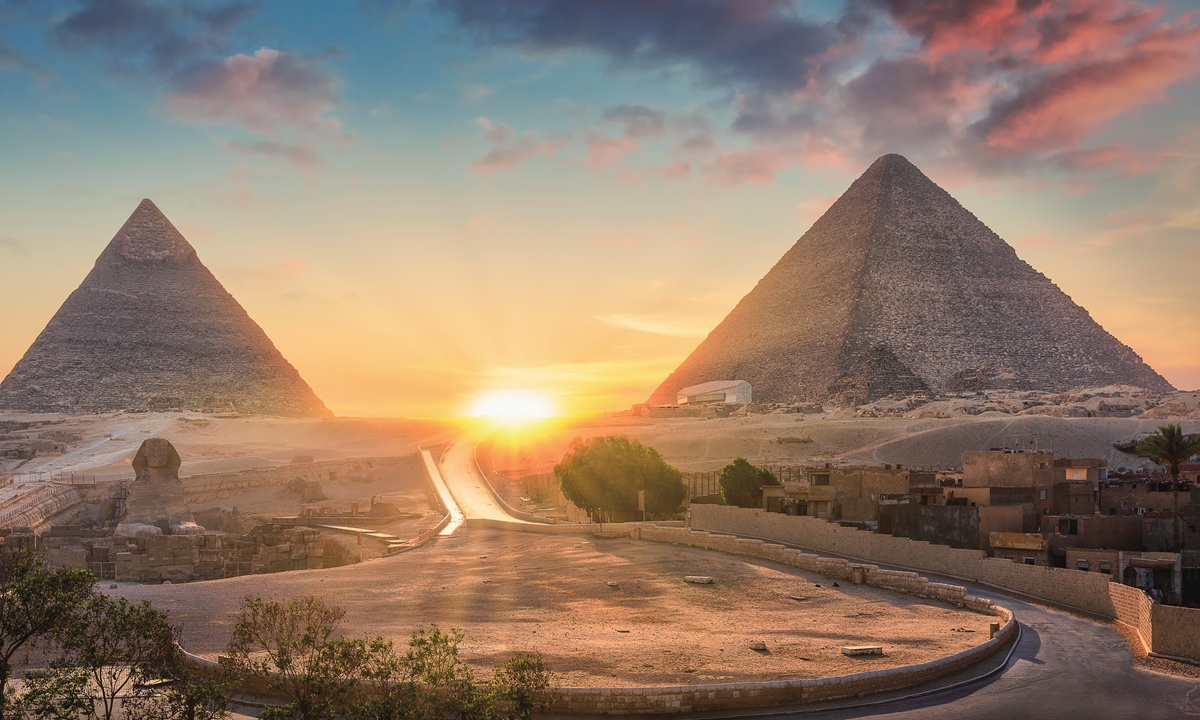
Egyptian pyramids Photo: VCG
GT: What are your expectations for the future development of China-Egypt Relations?
Hanafi: We are looking forward to strengthening the Comprehensive Strategic Partnership between the two friendly countries under the leadership of the two presidents, and reach the desired goals, in addition to promoting relations to a higher level, as both countries agreed in 2020 when H.E. Mr. Wang Yi, State Councilor and Minister of Foreign Affairs in China, visited Egypt in January 2020 as his first stop in his African tour, in addition to enhancing the current level of cooperation to increase the trade volume between the two countries.
Furthermore, Egypt is keen on promoting the level of coordination and mutual support with China in the multilateral platforms, as Egypt joined the New Development Bank in December 2021, and also joined the Shanghai Cooperation Organization (SCO) as a "dialogue partner" in September 2022
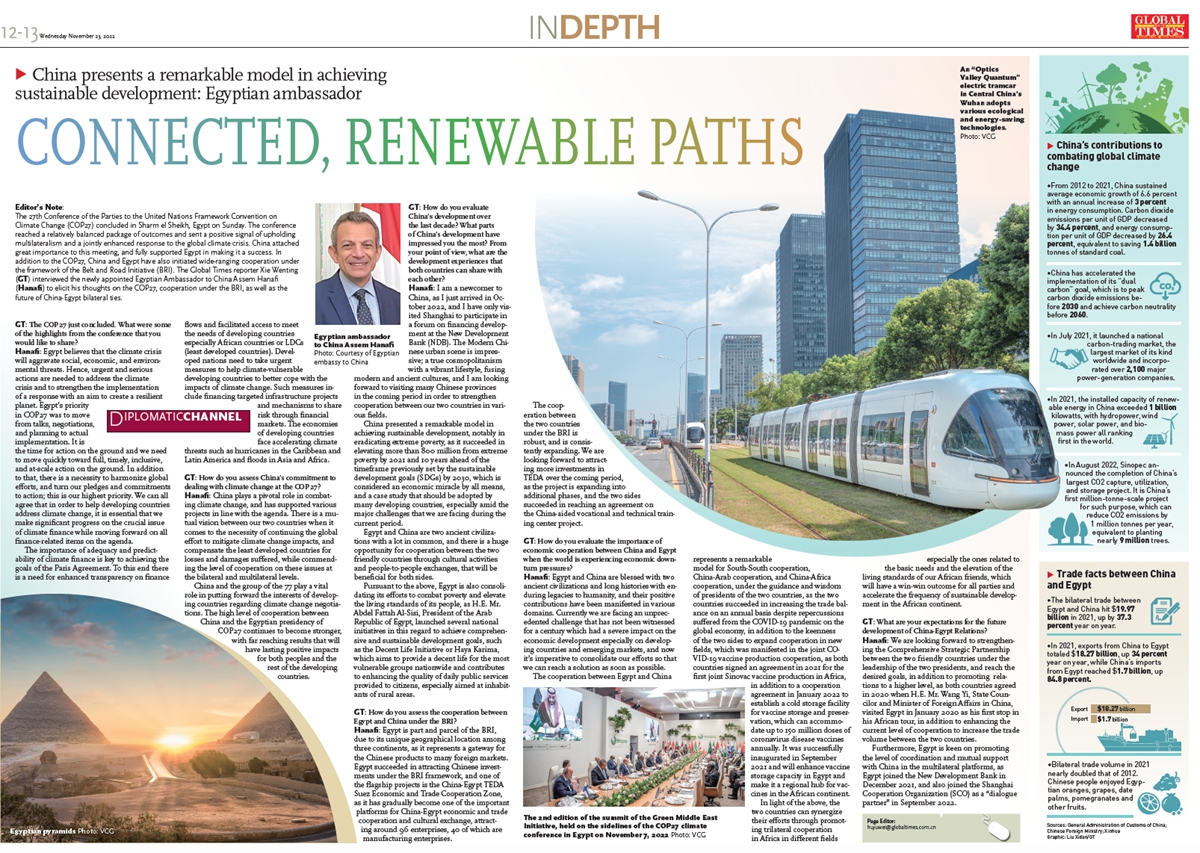
.
